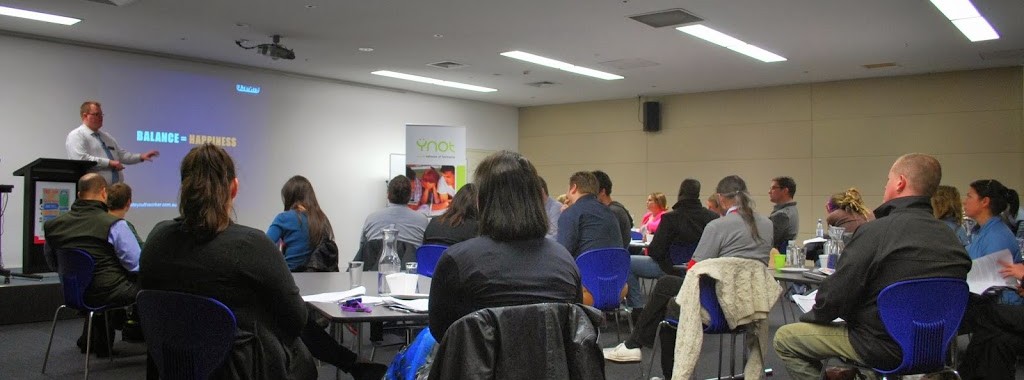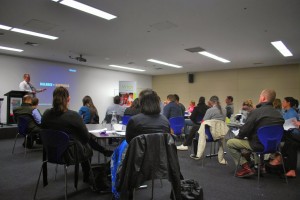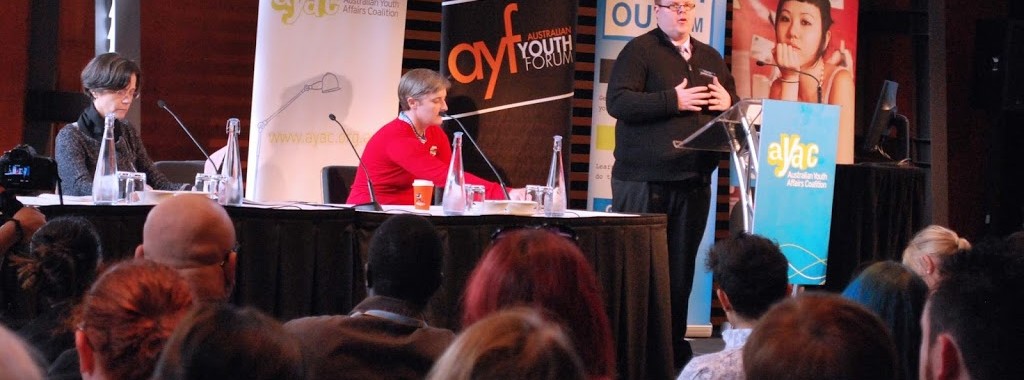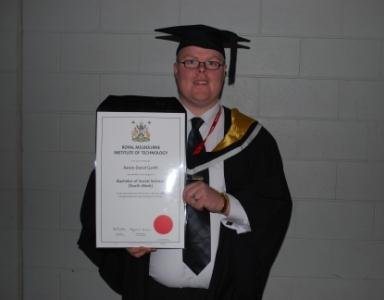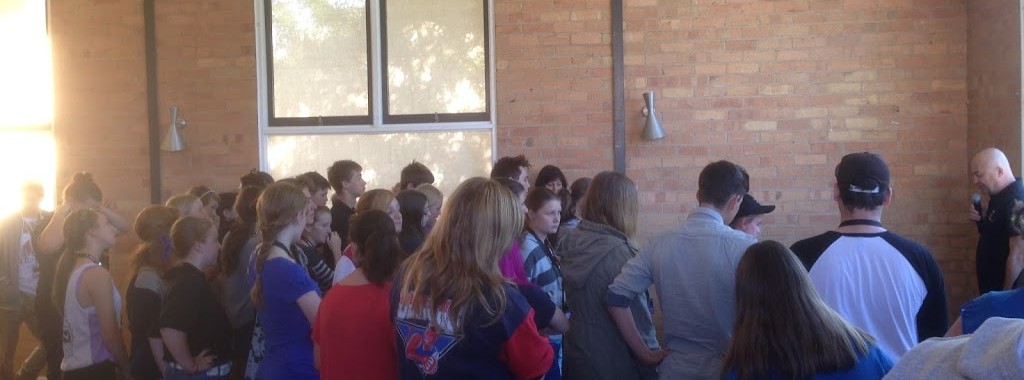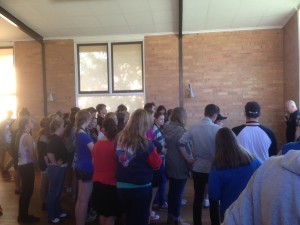-
Know who you are! The amount of students I speak to who do not have a good understanding of their own values and what makes them tick would blow your mind. One of the first things I ask when trying to help potential youth workers is why they want to be a youth worker… if you cant answer this question you may need to take a while to sort it out before continuing.
-
Volunteer work is a great way to build skills and experience. If you are young or have not worked in the sector before then volunteering with a reputable organisation can be a great way to get skills and training… and a job (or at least a good reference).
-
Get some qualifications. In this day and age qualifications are king. You need to have the piece of paper under your belt before many organisations will even look at you. Currently there is a push towards a minimum standard of a two year diploma in Australia, but more is better.
-
Build your networks. Join local council groups, local area networks and peak bodies. Anywhere there is a youth worker join their group. This gives you profile in the sector and opportunity to get information and information is key to good interviews.
-
Work out what area of youth work you most want to get into. Youth work is a wide and varied and it can give you an immense amount of joy… if you are in the right area. Work out what gets you going and then run for it with all your might.
Tag Archives: Education
I have been asked this question about a dozen times over the last six months by eager young potential youth workers looking to get a foot in the door to their future career. I have to say it is a hard one to answer. For me, I fell into it after a mate asked me to help out his Friday night youth group. So my own experience was of moving from volunteer to paid work and then study. However, many of these eager students are straight from school into youth work courses so what is my advice to them??? Work out what is going to work for you!
Here are a few ideas I have for these students and other would be youth workers:
Finally, when you have all of this completed just go to the organisation you are interested in working for and meet with the management. Give them a resume and talk about why you would like to work for them. They may through it in the bin, but they will remember you when you apply for an opening.
99% attitude and 1% skill: youth work students need to realise!
I have recently been reviewing the student placements of a number of youth work students. I have been speaking with their supervisors and have come to the conclusion that there is one thing that all youth work students need to know before they go on placement… it doesn’t matter how much you know or don’t know it is almost all about your attitude.
Many of the supervisors stated that they did not care how much the students knew they just wanted willingness to learn and a positive attitude. The students who showed these qualities were given great marks and amazing opportunities. For those that didn’t have the right attitude they were shunned and treated with reservation.
When you have students come into your organisation for placement gently remind them that their attitude is important to their overall success in their placement and in the sector. Skills are the 1%ers which can be taught. Attitude is the thing that will get them through every time.
When you have students come into your organisation for placement gently remind them that their attitude is important to their overall success in their placement and in the sector. Skills are the 1%ers which can be taught. Attitude is the thing that will get them through every time.
Vicarious trauma and youth workers: a recipe for disaster.
Today I was reflecting on my career and the major traumatic events that I have seen. I was speaking to a class of school chaplains looking at trauma and abuse. As I was reflecting it dawned on me how many truly traumatised people I have come across. On average two suicides a year, more sexually abused young people than I care to recall, many drug and alcohol abusers and self harmers to name a few.
When I got home I started to think of the many times I have struggled with the traumas of others. This vicarious trauma has almost taken me out of action on a number of occasions, mostly because of a lack of training and supervision. The biggest issue however, is that I care. When a traumatic event happens I actually give a crap. And this is the problem with our profession. Those who give a crap will always be at the mercy of vicarious trauma if they are not supervised and supported.
Today my class of chaplains looked at what trauma is, how it affects people and how to support people through trauma. What was lacking in the training was how as workers we deal with the vicarious trauma when it affects us. As a sector we need to develop a philosophy of self care that starts in the training rooms and lecture halls and follows us through to the end of our careers.
We need to do better: Critically reflective practice and supervision in youth work
This evening I sat in on a class preparing students for a masters degree placement in the human services. The topic for the class was supervision and particularly reflective supervision. As a company that believes we need a better class of reflective practice and supervision I was really keen to see what they would tell students. Sadly it was a waste of time.
The students were shown an article about a critical supervision model and were told to role play a scenario using the model. Then the class ended! This was the only class these students ever had about critically reflecting in supervision. I was shocked!!! The students had a model for critical reflective practice, however it was clear that very few of their placement supervisors really did critically reflective supervision.
We need to spend more time on the idea of critical reflection and supervision especially in higher education. What more can we expect when our students have a two hour class on the subject. We believe that for our sector to really become critically reflective it needs to be taught from the first class in our qualifications. For supervisors to be able to supervise well they need better training than a two hour class.
If you are an educator, a supervisor or a coalface worker we need to do better at critically reflective practice and supervision. Join with us to make this a part of your practice.
Apply for supervision today
Youth Work 2.0: A manifesto for the future.
We are on the brink of disaster! Our education of youth workers, lack of ongoing professional development opportunities, lack of self-care and professional support is leading to an under resourced service system at the breaking point. recently we heard that the revolving door at the end of youth work qualification is spitting people out of the sector 18 months after qualifying. This is a disaster!!!
When Ultimate Youth Worker began we saw these issues and asked ourselves what would youth work look like if it was properly resourced and supported post qualification, A second generation or 2.0 software update if you will. We wondered what it would take to bring us back from the edge. The list was long and extensive. Over the last year we have spruiked some of our ideas, but here are the two issues we see as critical to our coming year and advocacy in the sector.
-
First and foremost we need a sector that is resilient. The revolving door needs to be slammed shut. Lets be honest… as a sector we really suck at self care. We don’t teach it in our courses, we don’t do it in our organisations and our supervisors don’t know how to guide us through the difficult times. There are a few exceptions but the weight of stats and anecdotal evidence is against us. Self care must become a core component of our education and our practice.
-
We must get rid of our obsession with the idea of generalist youth work. That is a minimalist approach to a work which requires more of us. We need to be training specialist youth workers. Every degree should have an honours year where we specialise in an area of practice. AOD, Mental Health, Justice, Homelessness whatever the area young people are found there should be opportunities for specialisation. In particular we believe we should be training better youth mental health specialists at a bare minimum.
These are just two areas we will be advocating for and providing support in throughout the next 12 months and beyond. We have a long way to go but we must take the journey.
What do you think???
You can also leave us a comment below or post a comment on facebook and twitter.
If you haven’t yet, sign up for our newsletter to find out all the goings on at Ultimate Youth Worker (Sign up here)
2013 Australian Youth Affairs Conference wrap-up
From August 5-7 the team from Ultimate Youth Worker attended the Australian Youth Affairs Conference in Adelaide, South Australia. The conference was hosted by the Australian Youth Affairs Coalition the peak body for young people and the youth sector in Australia. For three days we covered the topics ‘youth participation’, ‘advocate for change’ and ‘support the sector’. On the third day our Director, Aaron Garth, spoke as part of the morning plenary session and delivered a training session on the development of a self care plan.
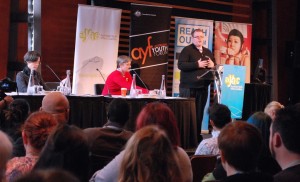 |
| Aaron Garth presenting at the morning plenary. |
Throughout the conference two themes emerged for the Ultimate Youth Worker team which we have been spruiking for well over a year. The first was the need for youth workers to have a better understanding of mental health. Whether it was the delivery of the mental health report card by Batyr and Young and Well CRC or the City of Casey youth services speaking about their online mental health tool, there was a clear need for youth workers to have a solid understanding of mental health and its effects on young people.
The second was how poor the understanding of self care strategies is in the youth sector. So many of the people we spoke to were near burnout or had people in their teams struggling with the weight of their roles. Many of the youth workers we spoke with spoke of pressures on them from their organisations and managers to do more with less resourcing and support.
The second was how poor the understanding of self care strategies is in the youth sector. So many of the people we spoke to were near burnout or had people in their teams struggling with the weight of their roles. Many of the youth workers we spoke with spoke of pressures on them from their organisations and managers to do more with less resourcing and support.
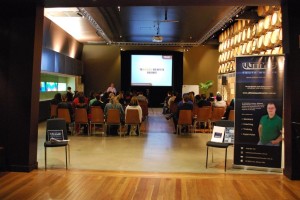 |
| Delivering the self care planning session. |
The AYAC2013 was a great success. But in our eyes it just confirmed what we have been saying for over a year. Look after yourself and know more about mental health.
Why so difficult: Understanding theory doesn’t need to be fear inspiring jargon.
I was speaking to some of my students recently about their time in the courses I teach in. Many of the student said the felt ill prepared and that they found that many of the teachers were hard to understand. When I delved into this it was that the teachers took pleasure in showing off their academic prowess and made everything seem really hard to understand. Many of the students still did not have a good understanding of basic theories and youth work practices as their teachers were speaking a whole other language…academic pomp.
In class this morning one of my students stated that I taught very different than her previous teacher. When I asked what the difference was she said that the teacher she previously had liked to talk on and on and delve deeply into a topic without making the basics understandable. After the first few classes she felt lost and every class after that compounded her feeling of being lost.
I asked what she liked about my style and she said she could understand what I was saying because I spoke in a way they could understand. I don’t use a lot of jargon when I teach. I can, but I was once told that the mark of understanding was the ability to distil knowledge to the lowest common denominator. If you can’t understand it is often because the teacher is making it too difficult.
When I was in high school I sucked at mathematics. I could not understand algebra or algorithims and every year I fell further behind. In year ten one of my teachers realised that I had missed the basics and this was what led to my lack of understanding here. She spent a number of weeks teaching me the basics and had me caught up and surpassing my peers in less than a term. The main thing was I needed the basics and I needed to understand.
No one fails my subjects through a lack of understanding. I teach as if I am explaining to a ten year old until my students get it and then I move on. If you struggle with youth work theory and practices it might just be that you were poorly taught. get back to basics and rid yourself of jargon and you will get passed the fear of theory.
You can also leave us a comment below or post a comment on facebook and twitter.
If you haven’t yet, sign up for our newsletter to find out all the goings on at Ultimate Youth Worker. (Sign up here)
A sense of entitlement: youth work education in the 21st century.
Over the past few months I have spoken with over a dozen youth work educators from throughout the world about the calibre of youth work students coming through there courses. These course range from one year to three years and have people from all walks of life coming in droves to study. But one thing seems to have united the student body more than anything… A sense that they are entitled to become youth workers!
A little over a decade ago I decided to become a youth worker. It was an audacious plan for a young bloke who had never finished high school or anything else he had put his hand to. I had a reverence for the profession and an academic fear of my lecturers. I would have heated discussions and difficult conversations but when the lecturers called an end to those conversations that was the end. When they told me something needed to be done I did it or I failed (and I did fail once). Above all I knew that youth work was a profession that expected the best and if we didn’t like it we could bugger off.
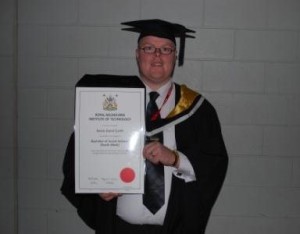 |
| As you can see I stayed and made it out with a degree. |
All the youth work educators I have spoken with have told me that there are some students who still hold the reverence for the profession and the educators however more than ever before there is a sense of entitlement in new students. They seem to believe that getting their qualification is a foregone conclusion and the teachers are just in the way of them entering the sector. This feeling has been reiterated by the numerous organisations I place students in to gain experience. The organisations are seeing lazy, unprofessional and generally unworthy people coming through. What has gone wrong?
Could it be that youth work is seen as an easy ride? That people see youth workers as those who cruise through with no need for excellence? Has the free market made youth work for the lowest bidder attractive to those with no hope and no reason to work? Or perhaps it is that youth work education which aims at the lowest common denominator has finally found it.
We are in trouble! We need to bring back a level of respect for our profession. We need to see excellence. We need quality over quantity. We need to be graduating youth workers who want to be in the field because they are passionate and qualified. We need youth workers with a reverence for the work.
You can also leave us a comment below or post a comment on facebook and twitter.
If you haven’t yet, sign up for our newsletter to find out all the goings on at Ultimate Youth Worker. (Sign up here)
Top 5 blog posts of the first twelve months of Ultimate Youth Worker.
Well its almost been twelve months! On the 26 June 2012 we started out on a journey to support youth workers and the organisations they work for and never looked back. It has been an interesting time. We have made many friends and a few enemies. We have asked you all to imagine a new youth work. We have asked you to be better than before. To become the most highly skilled workforce in youth work history. To become truly excellent in all we do.
Over the next few weeks we will look at what we have achieved in our first twelve months in business. Today we will look at our top five blog posts of the year.
-
Build your network Sep 20, 2012. Having a strong network is key to a youth workers effectiveness. To support our young people we need to have a broad and deep pool of people that we can call on when the chips are down. This post tells you how to get started.
-
AccountabilitySep 12, 2012. The second pillar to our “Model of Effective Youth Work Practice“, Accountability is more important to our best-practice than ever before. Accountability through mentors, good supervisors and reflective practice groups are all great ways to start.
-
What will youth work look like in 2013? This series was an amazing opportunity for us to get some of the people we look up to in the sector to discuss what they saw as the next step in the youth services sector. Shae and Stephen, Professor Dana Fusco, Sam Ross, Professor Howard Sercombe and our Director Aaron Garth all spoke on this and it has been one of our most read group of posts.
-
Reflective practice: Why we should journal. Aug 21, 2012. In our youth work courses they require us to do some journaling at some stage as a chance to reflect on our practice… so why do we stop when we enter the field as employees? This post asks us to get back in the habit.
-
Setting boundaries in youth work: How much do I share about me? Oct 31, 2012. As a teacher in a youth work course this is one of the questions I always get asked when students go on placement. knowing how much to share about ourselves is one of the hardest questions to grapple with because there is no straight answer.
These posts were the top posts of our first year in the field. We have written dozens of others and had a lot of support from other contributors. We hope that next year brings you just as many if not more awesome posts.
Youth worker education: The time for change is nigh.
A while ago we wrote on what post-qualifying education might look like for the youth sector. We had a number of people agree and disagree with our thoughts but the one thing that we kept coming back to was the current state of youth worker education. Our sticking point in these discussions was the lack of practical placement in current education.
In a recent survey of its members the Youth Workers Association in Victoria came to the belief that no more than 30% of a youth work course should be undertaken “on the job”. The reality of the average youth work degree is that it is more like 15%. The issue that we see is that youth worker education is becoming an almost purely theoretical endeavour. When the core of our work is developing relationships can this truly be taught through theory alone???
Recently I was chatting with a friend who is completing a degree in tourism and marketing and he was surprised to hear that we did not need to complete an industry year. In his course they complete two years of study, then an industry year, and return to complete their final year. This not only leads students to gain a practical understanding of their field, but also provides links to employment.
As a teacher in the field education of youth workers and a former employer I have noticed a severe lack of industry knowledge and practical skills in students and graduates of youth work courses. In our attempt to make youth work a theoretically sound profession we are losing much of the practice skill development. We are turning out a great number of theoretical practitioners but rare is the great practitioner.
We don’t need less practical placement in youth work education, we need more! You can’t learn youth work from a book…it must be learnt through doing it. Sixty-five days of placement in a couple of youth services is not nearly enough for students to gain a depth of understanding in youth work practice. We believe that the model of an industry year is a good starting point however to make it a worthwhile learning experience there must be opportunities to critically reflect for both student and organisation. Mentoring of new students is a possible answer to this conundrum. Perhaps universities could provide regular seminars on new research as a link between industry and academia.
The point is students need to have a stronger link to industry before they graduate.
